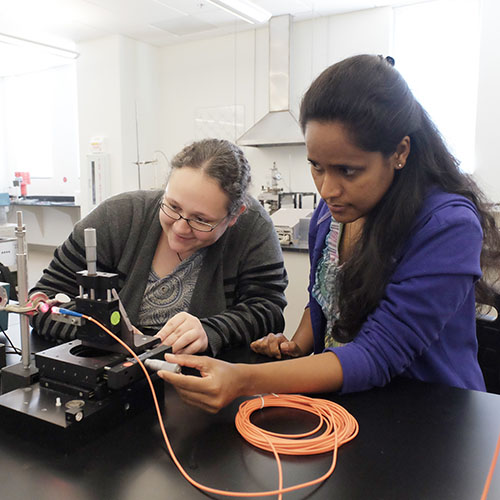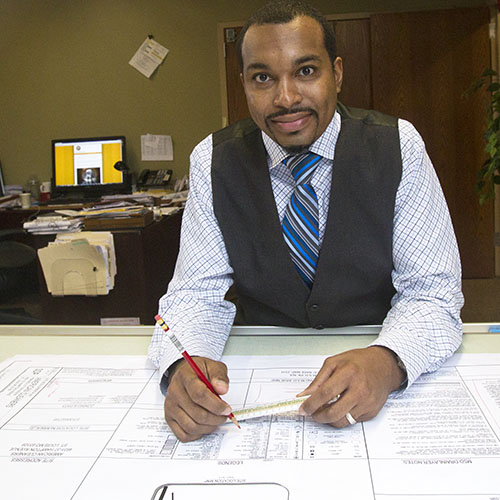The Joint Engineering program will continue with the support of UMSL and Washington University through summer 2029. New students will no longer be admitted to the program after January 2026. If you are interested in majoring in engineering at UMSL and are starting after January 2026, please visit the Civil Engineering major in the School of Engineering.
Get a Bachelor of Science in Civil Engineering that’s both competitive and affordable
The work of civil engineers is everywhere – from the roads and buildings we use every day to the utilities and transit hubs that keep daily life running.
Become one of the talented professionals designing this essential infrastructure with a Bachelor of Science in Civil Engineering from the Joint Engineering Program at the University of Missouri–St. Louis. Our joint civil engineering degree combines strengths of UMSL and the McKelvey School of Engineering at Washington University in St. Louis to provide a flexible program that benefits both students and the St. Louis community.
Your first two years will consist of affordable foundational classes at UMSL, while your upper-level engineering courses will be taken at WashU. You’ll have full access to both faculties and all the opportunities each school offers.
The Bachelor of Science in Civil Engineering (BSCIE) through the Joint Engineering Program is accredited by the Engineering Accreditation Commission of ABET, under the General Criteria and the Civil Engineering Program Criteria.
A degree in civil engineering designed around your career
All engineering courses for the civil engineering degree are held in the late afternoon or the evening, so working professionals can fit the degree into their schedule. Students not yet in the workforce can take advantage of this schedule to complete internships and co-ops during the day.
In addition, you can tailor your degree to your career plans by choosing between the Water Resources/Environmental Engineering Track and the Structural Engineering Track.
Program type:
Major, BSCIE
Format:
On-Campus
Take the next step
Request more information below:

Why earn your Bachelor of Science in Civil Engineering at UMSL?
A BS in civil engineering from the UMSL Joint Engineering Program prepares you for a successful career through its:
- Accessibility to Washington University. You’ll use Washington University labs and libraries, and upper-level courses are taught by WashU faculty.
- Support services from both universities. As a joint student, you’ll enjoy twice the support in terms of internship placements, career counseling, and other services.
- Experienced faculty. At both UMSL and WashU, most faculty are working engineers who bring real-world expertise to their classes.
- Affordability. Exceptional value for access to two universities.
- Internship and co-op opportunities. Civil engineering in St. Louis is a thriving field, making internship opportunities nearly limitless.
- Evening schedule. All courses are held in the late afternoon or evening, leaving you free to work or intern during the day.
What can you do with a Bachelor of Science in Civil Engineering?
Civil engineers work in a wide variety of environments. A civil engineer may design infrastructure, like roads, bridges, railways or waterways. Or they may find work creating sewage systems, designing building components or planning utility pipelines.
Common employers of civil engineers include engineering firms, construction companies, utility companies and more. UMSL students with an engineering degree often find employment in civil engineering in St. Louis and the surrounding area, sometimes at the same companies they interned with. In a survey of graduates with a bachelor of science in civil engineering, we found that over 95 percent are either employed or pursuing an advanced degree.
According to the U.S. Bureau of Labor Statistics, the median pay of a civil engineer is $95,890 per year, and the field is expected to grow 5 percent over the next 10 years.
95,890
5
Career Opportunities
- Construction Operations and Management
- Geotechnical Engineering
- Structural Analysis and Design
- Transportation and Urban Planning
- Water Resources and Environmental Engineering
Program Educational Objectives
The objectives are to:
-
Meet the expectations of employers of civil engineers and acquire the professional experience necessary for career advancement and attaining professional licensure.
-
Pursue higher learning and advanced knowledge to adapt to evolving technologies and needs of the world.
-
Actively engage with communities to account for societal impacts including sustainability, with high ethical standards.
Student Outcomes
Upon completion of the program, graduates will have an ability to:
-
identify, formulate, and solve complex engineering problems by applying principles of engineering, science, and mathematics;
-
apply engineering design to produce solutions that meet specified needs with consideration of public health, safety, and welfare, as well as global, cultural, social, environmental, and economic factors;
-
communicate effectively with a range of audiences;
-
recognize ethical and professional responsibilities in engineering situations and make informed judgments, which must consider the impact of engineering solutions in global, economic, environmental, and societal contexts;
-
function effectively on a team whose members together provide leadership, create a collaborative environment, establish goals, plan tasks, and meet objectives;
-
develop and conduct appropriate experimentation, analyze and interpret data, and use engineering judgment to draw conclusions, and
-
acquire and apply new knowledge as needed, using appropriate learning strategies.
Plan of study
A program of 132 semester hours is required for the Bachelor of Science in Civil Engineering.
Majors must complete the University General Education and Graduation requirements, the Pre-Engineering Requirements, the Core Engineering Requirements, and Major Requirements.
A minimum grade of C- is necessary to meet the prerequisite requirement for any course.
General Education Requirements
The following courses fulfill general education and graduation requirements and are required of Civil Engineering majors:
| PHIL 2259 | Engineering Ethics | 3 |
| PHIL 3380 | Philosophy of Science | 3 |
| HIST 1001 OR HIST 1002 |
American Civilization 1865 to Present (MOTR HIST 102) | 3 |
| Three Additional Science Courses 1 | 9 | |
Total Hours |
18 |
|
| 1 Humanities and social sciences electives must meet both the University of Missouri—St. Louis General Education Requirements and the Humanities and Social Sciences Requirements of the Joint Undergraduate Engineering Program. Check with your advisor for details. | ||
Pre-Engineering Requirements
Students seeking to major in engineering are first designated as ‘Undeclared with an interest in Engineering majors’ until they have completed Math 1800 Analytical Geometry & Calculus I. Upon successful completion of Math 1800 with a grade of C or better, students will be allowed to declare pre-engineering as their major. Math 1800 must be completed successfully within two attempts.
| MATH 1800 | Analytic Geometry and Calculus I | 5 |
| MATH 1900 | Analytic Geometry and Calculus II | 5 |
| MATH 2000 | Analytic Geometry and Calculus III | 5 |
| MATH 2020 | Introduction to Differential Equations | 3 |
| CHEM 1111 | Introductory Chemistry I (MOTR CHEM 150L) | 5 |
| GEOL 1001 | General Geology | 3 |
| PHYSICS 2111 | Physics: Mechanics and Heat | 4 |
| PHYSICS 2111L | Mechanics and Heat Laboratory | 1 |
| PHYSICS 2112 | Physics: Electricity, Magnetism, and Optics | 4 |
| PHYSICS 2112L | Electricity, Magnetism, and Optics Laboratory | 1 |
| ENGR 2310 | Statics | 3 |
| ENGR 2320 | Dynamics | 3 |
| ENGL 1100 | First-Year Writing (MOTR ENGL 200) | 3 |
Total Hours |
45 |
|
Engineering Core Requirements
| CMP SCI 1250 | Introduction to Computing | 3 |
| J E COMM 2000 | Engineering Studio I | 1 |
| ENGL 3130 | Technical Writing | 3 |
Total Hours |
7 |
|
Civil Engineering Major Requirements
| J C ENGR 2160 | Surveying | 3 |
| J C ENGR 1430 | Introduction to Engineering Design: CAD & GIS | 2 |
| J C ENGR 3210 | Computer Methods of Engineering Analysis | 2 |
| J C ENGR 3410 | Structural Analysis | 3 |
| J C ENGR 3420 | Structural Design | 3 |
| J C ENGR 3360 | Civil Engineering Materials Lab | 1 |
| J C ENGR 3430 | Civil Engineering Design CAD & GIS | 2 |
| J C ENGR 3460 | Transportation Engineering | 3 |
| J C ENGR 3760 | Hydraulic Engineering | 3 |
| J C ENGR 4190 | Soil Mechanics | 3 |
| J C ENGR 4200 | Soil Exploration and Testing | 1 |
| J C ENGR 4600 | Highway and Traffic Engineering | 3 |
| J C ENGR 4640 | Foundation Engineering | 3 |
| J C ENGR 4670 | Structural Design Projects | 3 |
| or J C ENGR 4910 |
Hydrology and Hydraulic Design Project | |
| J C ENGR 4730 | Construction Operations and Management | 3 |
| J C ENGR 4740 | Economic Decisions in Engineering | 3 |
| J C ENGR 4950 | Fundamentals of Civil Engineering Review | 1 |
| J C ENGR 4990 | Senior Civil Engineering Seminar | 1 |
| J M ENGR 2410 | Mechanics of Deformable Bodies | 3 |
| J M ENGR 3360 | Material Science for J C ENGR | 3 |
| J M ENGR 3700 | Fluid Mechanics | 3 |
| J M ENGR 3721 | Fluid Mechanics Laboratory | 1 |
| MATH 1320 | Introduction to Probability and Statistics | 3 |
| Civil Engineering Electives | 6 | |
Total Hours |
62 |
|
All majors must meet the general education requirements of the university in addition to completing degree-specific curriculum requirements.
Review Full Degree Requirements Review Sample Four-Year Plan
Non-Missouri Residents: Prospective students are responsible for reviewing the UMSL state authorizations page to see if this program is offered in their state throughout their program and to review the licensure or certification requirements for the state in which they reside.
| Academic Year | Enrollment | Graduates |
|---|---|---|
| 2018-2019 | 59 | 13 |
| 2019-2020 | 68 | 7 |
| 2020-2021 | 62 | 19 |
| 2021-2022 | 56 | 19 |
| 2022-2023 | 38 | 13 |
| 2023-2024 | 37 | 8 |
Student organizations
Make new friends and learn new skills by joining one of our Recognized Student Organizations. Here are several opportunities you may be interested in as a civil engineering major:
- Society of Future Engineers
- Student Government Association
- Students of the University of Missouri
Networking Opportunities
Meet local professionals and enrich your experience through the Society of Future Engineers Speaker Series.
You can also network through our mentorship program, which pairs undergraduates with mentors in the industry, many of whom are alumni.
Honors College
The UMSL Honors College is a certificate program that can be paired with any major without adding extra classes or extending time to graduate. Classes in the Honors College are seminar-style, meaning that they are based in reading, writing, discussion, and critical thinking. This unique class format fosters an intellectual climate centered around democracy, civility and academic excellence.








